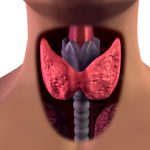 A thyroid nodule is a lump on the thyroid. The thyroid is located in the neck and is responsible for the regulation and release of hormones. Thyroid nodules – or cysts – can often be symptomless and go undetected, unless a doctor locates them during a check-up. If a thyroid nodule is large it may be easily visible and disrupt breathing. Often thyroid nodules are of low concern, but your doctor may run tests to ensure they are safe and won’t lead to further health concerns.
A thyroid nodule is a lump on the thyroid. The thyroid is located in the neck and is responsible for the regulation and release of hormones. Thyroid nodules – or cysts – can often be symptomless and go undetected, unless a doctor locates them during a check-up. If a thyroid nodule is large it may be easily visible and disrupt breathing. Often thyroid nodules are of low concern, but your doctor may run tests to ensure they are safe and won’t lead to further health concerns.
Causes and symptoms of thyroid nodules
 Many factors can contribute to the cause of thyroid nodules. Common causes of thyroid nodules include:
Many factors can contribute to the cause of thyroid nodules. Common causes of thyroid nodules include:
- Iodine deficiency: Iodine is used by the thyroid, but low levels can result in thyroid nodules. Although iodine deficiency can cause thyroid nodules, it is uncommon in America.
- Overgrowth of thyroid tissue (adenoma): It is unknown as to why thyroid tissue would overgrow, but it can be a cause of thyroid nodules. Non-cancerous overgrowth of thyroid tissue may become bothersome due to size and can lead to hyperthyroidism.
- Thyroid cyst: This usually occurs when an adenoma begins to break down.
- Chronic thyroid inflammation (thyroiditis): An underlying illness can result in the thyroid becoming inflamed, like Hashimoto’s disease. This is commonly associated with hypothyroidism.
- Multinodular goiter: This is the enlargement of the thyroid, either caused by a thyroid disorder or iodine deficiency.
- Thyroid cancer: Only a small percentage of thyroid nodules are cancerous. A large thyroid nodule which causes pain is more inclined to be checked for cancer.
Advertisement
Thyroid nodules are typically symptomless, but to know if you have one they can often be felt by touching the neck. If it’s large, it can be seen on the neck and may lead to shortness of breath if it pushes on your esophagus.
Some symptoms, though, that may be associated with thyroid nodules are:
- Unexplained weight loss
- Intolerance to heat
- Tremor
- Nervousness
- Rapid or irregular heartbeat
Treatment of thyroid nodules
 Whether the thyroid nodule is cancerous or not determines the mode of treatment. Treatment for a benign thyroid nodule includes:
Whether the thyroid nodule is cancerous or not determines the mode of treatment. Treatment for a benign thyroid nodule includes:
- Monitoring the nodule
- Thyroid hormone suppressant therapy
- Surgery – if the nodule is bothersome
- Radioactive iodine – if the nodule is causing hyperthyroidism
- Anti-thyroid medications – if the nodule is causing hyperthyroidism
Unfortunately, there is no clear-cut way to prevent thyroid nodules. They are something that has to be monitored to ensure they don’t lead to more serious conditions.
Related Reading:
Facts about thyroid eye disease
The thyroid’s main responsibility is to regulate and produce hormones. When the thyroid is healthy and there are normal hormone levels in the blood, this is referred to as euthyroid. If there is a problem with the thyroid it can either produce too many hormones or too few. Continue reading…
Advertisement
Many studies as of late have been showing a strong connection between the gut and other parts of the body. One such connection is the gut-mind connection, which reveals how emotions and stress can trigger health problems in our gut. Recent studies have revealed a connection between the thyroid and the gut. Continue reading…
Sources:
http://www.mayoclinic.org/diseases-conditions/thyroid-nodules/basics/definition/con-20021546
http://www.healthline.com/symptom/thyroid-nodules
http://www.medicinenet.com/thyroid_nodules/page2.htm
